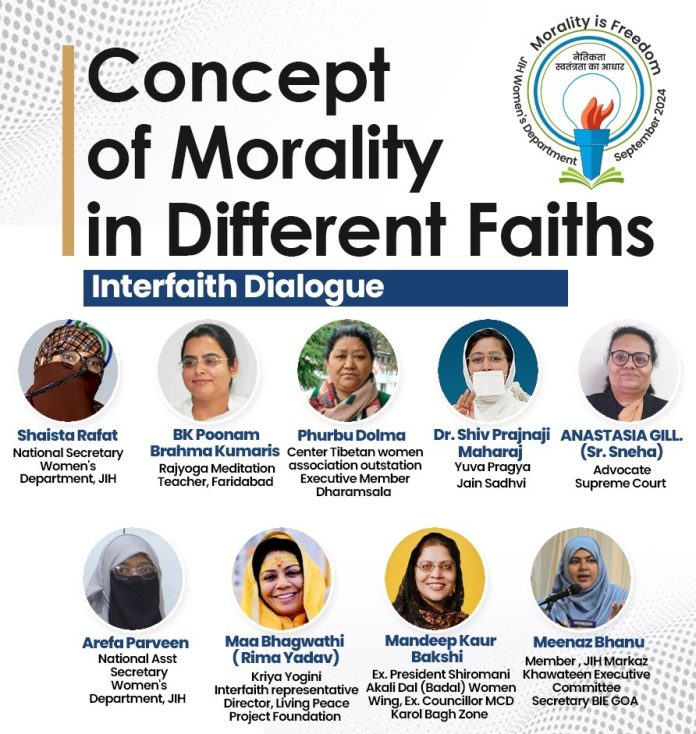The Women’s Wing of Jamaat-e-Islami Hind (JIH) recently organized a virtual interfaith dialogue on the “Concept of Morality in Different Faiths.” Esteemed speakers from various religious backgrounds gathered to share their insights on the significance of morality in today’s world, highlighting how ethical values serve as a cornerstone for personal and societal development.
Delivering the welcome address, Arefa Parveen, National Assistant Secretary of the Women’s Department at JIH, set a reflective tone for the event. She explained the concept of true independence and how it is often misunderstood as slogans like “my body, my rules.” She highlighted contemporary moral challenges, referencing a Times of India report indicating that 50% of Indians accept live-in relationships and addressing the rise in pornography and its negative impact on societal values. Arefa emphasized the importance of returning to moral guidelines to combat these pressing issues.
In her presidential address, Shaista Rafat, he National Secretary of JIH Women’s Department, reinforced the timeless necessity for moral values. She reminded the audience that morality has been a guiding force for societal well-being since the inception of humanity. Rafat emphasized that all religions possess ethical principles aimed at curbing moral evils, calling on religious leaders to take responsibility for guiding their communities.
The dialogue featured diverse perspectives from various faiths. Mandeep Kaur Bakshi, the Ex-President of the Shiromani Akali Dal Women Wing, represented Sikhism by stressing that morality begins within the home. Drawing from Sikh teachings and the example of Mai Bhago, she highlighted the ripple effect of personal responsibility and ethical behavior on the wider community. Bakshi advocated for reinforcing these values in children to help them navigate today’s fast-changing world.
Maa Bhagwathi, also known as Rima Yadav, a Kriya Yogini and Interfaith Representative, brought the Hindu perspective into the discussion. She explained that following Dharma (righteous duty) is central to leading a moral life. She discussed the importance of self-reflection and spiritual growth as essential paths to personal morality, asserting that aligning actions with higher principles contributes positively to society. Bhagwathi emphasized that true freedom involves rising above worldly desires and living in harmony with universal laws.
Anastasia Gill, an advocate practicing in the Delhi High Court and Supreme Court and a former DMC member, spoke on the Christian concept of morality, which is rooted in love, compassion, and community service. She underscored that moral actions should benefit others and contribute to societal betterment, highlighting the role of Christian teachings in promoting social justice and protecting the rights of marginalized groups. Gill emphasized that love and forgiveness are integral to creating a more equitable society.
Phurbu Dolma, an Executive Member of the Center for Tibetan Women’s Association in Dharamsala, shared insights from Buddhism, focusing on women’s empowerment and the need for moral responsibility in daily life. She noted that Buddhism respects all religions equally, reflecting a universal commitment to ethical values.
Meenaz Banu, a member of the JIH Markaz Khawateen Executive Committee and Secretary of BIE Goa, emphasized the Islamic viewpoint on morality, particularly regarding marriage and modest behavior. She clarified that true freedom is often misunderstood as “my life, my choice,” emphasizing that Islam teaches freedom through alignment with God’s laws. Citing Quranic verses on modesty, she warned of the societal dangers of alcohol and its disruptive effects on families and communities.
BK Poonam, a Rajyoga Meditation Teacher from the Brahma Kumaris in Faridabad, discussed the role of meditation in cultivating morality. She explained that right thoughts lead to right actions and highlighted the contemporary struggle to control the mind. Poonam advocated for reconnecting with one’s inner self through meditation to align actions with spiritual values, urging individuals to strengthen their bond with the Creator to lead a moral life.
The seminar successfully highlighted the shared significance of morality across different faiths, emphasizing the need for ethical living at both personal and societal levels to address today’s moral challenges. The dialogue encouraged participants to reflect on how their faiths can contribute to building a more compassionate and morally sound society.




